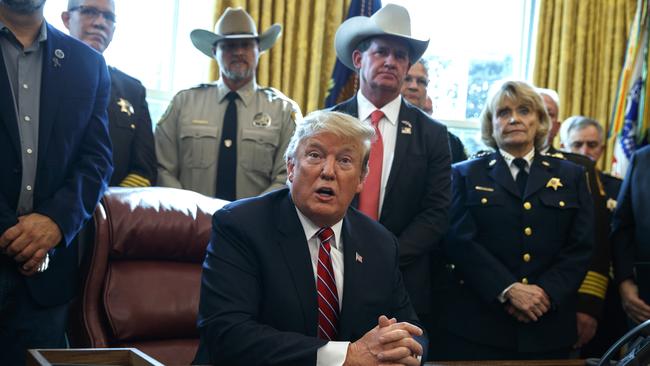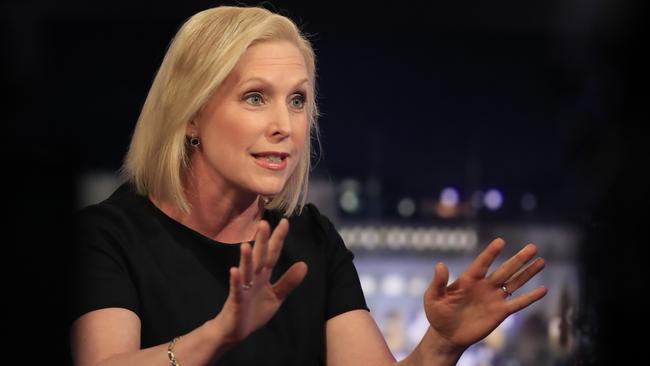Donald Trump slammed over NZ massacre comments
Democrats accuse US President of ‘emboldening white supremacists’ as NZ mosque massacre triggers furious debate.

The New Zealand mosque massacre has triggered furious debate in the United States about the threat posed by white nationalism with Democrats accusing Donald Trump of downplaying the issue and ‘emboldening white supremacists’.
The murderous rampage by Australian-born Brenton Tarrant, which left 50 people dead, dominated the front pages of US newspapers, with some reports accusing Australia of providing fertile ground for an Islamophobic culture.
The mass murder led police across the US to step up security in the country’s mosques with mosques in New York guarded at the weekend by police in tactical gear armed with semiautomatic rifles.
Mr Trump spoke with New Zealand Prime Minister Jacinda Ardern saying the US was with New Zealand ‘100 per cent’ after the shooting which he described as ‘a horrible disgraceful thing, a horrible act’.
“I told the prime minister that the United States is with them all the way, a hundred per cent,” Mr Trump said. “Whatever they need, we will be there. New Zealand has been a great friend and partner for many years. Our relationship has never been better. And what they’re going through is absolutely terrible.”
But when asked if he saw white nationalism as a rising threat around the world, Mr Trump replied: “I don’t really. I think it’s a very small group of people that have very, very serious problems.’
His comments were criticised by Democrat presidential contender Senator Kirsten Gillibrand who accused the president of emboldening white supremacists.

“Time and time again, this president has embraced and emboldened white supremacists — and instead of condemning racist terrorists, he covers for them,” she tweeted. “This isn’t normal or acceptable. We have to be better than this.”
Democrat Senator Richard Blumenthal also linked Mr Trump’s rhetoric to the New Zealand massacre.
“Words have consequences like saying we have an invasion on our border and talking about people as though they were different in some fatal way,” Senator Blumenthal said.
Mr Trump has previously been criticised for soft-pedaling the issue of white nationalism after he appeared to defend white-nationalists at the “Unite the Right” rally that sparked the violence in Charlottesville in 2017, where one person was killed. Mr Trump said he condemned the white nationalists but added that there were “Some very fine people, on both sides’’ of the protest groups.
The president’s political opponents have also long accused him of targeting Muslims with his travel ban as president and his call in December 2015 to ban all Muslims from entering the US.
In the manifesto Mr Tarrant wrote before the killings he asked himself the question: “Were/are you a supporter of Donald Trump?”
His answer was: “As a symbol of renewed white identity and common purpose? Sure. As a policy maker and leader? Dear god no.”
However, Republicans pushed back against the Democrat accusations.
Republican congressman Adam Kinzinger said: “I’m not defending all of the president’s language on this stuff. What I’m saying though, if you look at the Holocaust where six million Jews were killed … that was way before President Trump.’
The White House strongly denounced any link between the president’s rhetoric and the mosque killing.
“It’s outrageous to even make that connection between this deranged individual that committed this evil crime to the president who has repeatedly condemned bigotry, racism and made it very clear that this is a terrorist attack,” White House spokeswoman Mercedes Schlapp said.
The New Zealand killings also sparked broad debate in the US about the role of the internet — fanned by social media such as Facebook, YouTube and Twitter — of fostering and creating a dark subculture of white supremacists and other hate groups.
Cameron Stewart is also US Contributor for Sky News Australia




To join the conversation, please log in. Don't have an account? Register
Join the conversation, you are commenting as Logout